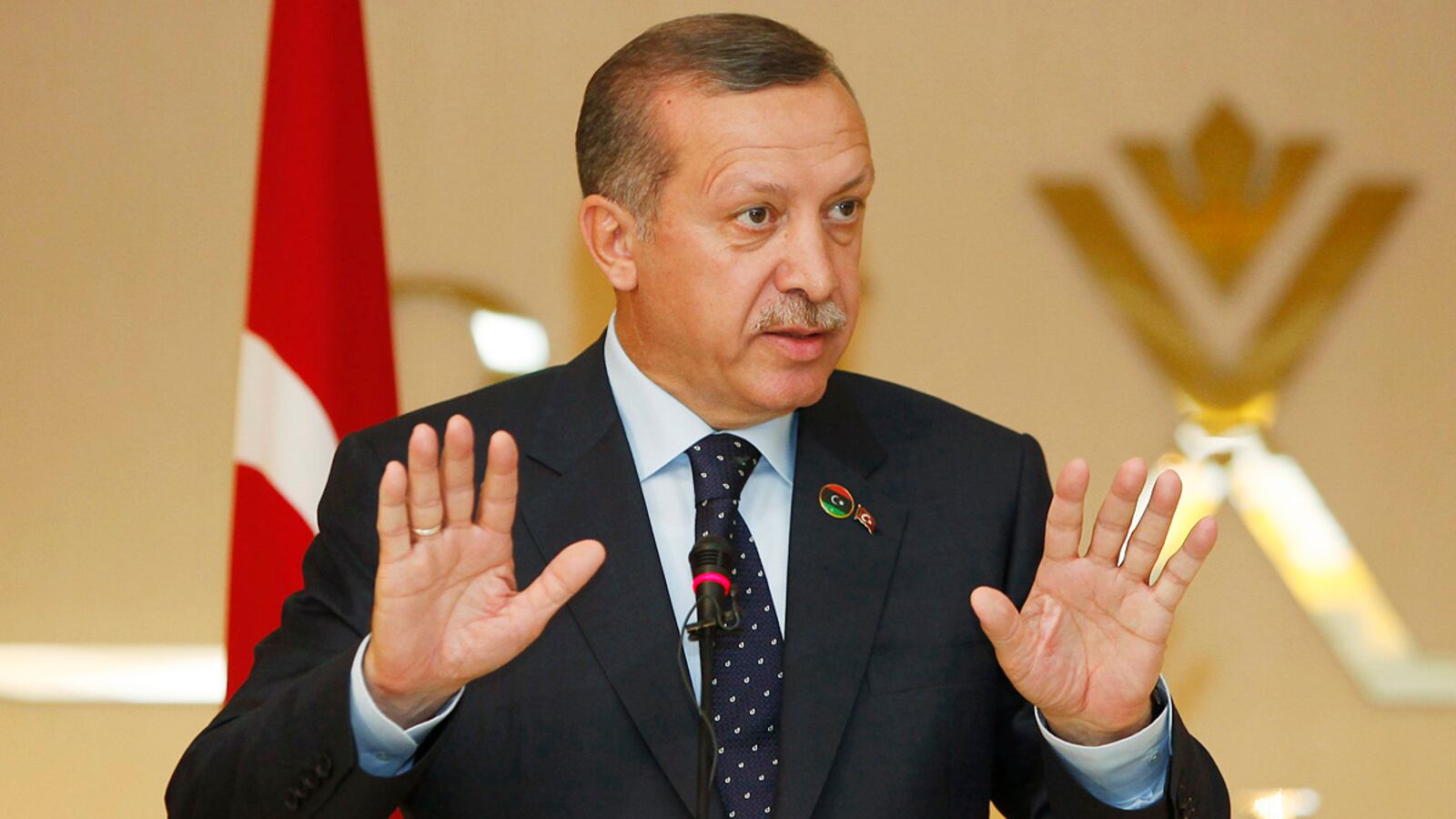Turkey’s Prime Minister Recep Tayyip Erdogan is a man with a mission. In New York this week, fresh from a triumphal tour of the Arab Spring countries, Erdogan will throw his country’s considerable diplomatic weight behind Palestine’s (probably doomed) bid for full statehood at the United Nations General Assembly. He’s also meeting with President Obama on a range of regional issues close to Washington’s heart: Israel’s growing diplomatic isolation, Iran’s nuclear program, the crumbling of the Assad regime in Syria, fostering democracy in the Arab world. In each of these, Turkey is a key player—far more important, in many ways, than the U.S. itself.
As Turkey’s relationship with Israel has disintegrated, there’s been a lot of talk of Turkey moving away from its old alliance with the U.S. But in reality, what’s striking is how much common ground Ankara still has with Washington—and how closely allied the two nations’ agendas are. In 2003, in the run-up to the Iraq war, George W. Bush spoke of the U.S.’s “freedom agenda” in the Middle East. The regimes set up in Iraq and Afghanistan after Western interventions didn’t—to put it mildly—do much to advertise the benefits of democracy. But now, nearly a decade after the U.S. set out to reset the vicious cycle of despotism and political dysfunction in the Middle East, Bush’s agenda is finally coming to pass. And Erdogan is far better placed than Bush to promote real, lasting democracy in his neighborhood.
“During the Bush administration, 'freedom' and 'democracy' even became dirty words in the Middle East, for they sounded as euphemisms for sinister Western designs,” says Turkish columnist Mustafa Akyol author of a new book, Islam Without Extremes. “Arabs needed to hear a 'freedom agenda' from … a fellow Muslim in whose faith and politics they would trust.”
Consider Erdogan’s recent tour of Egypt, Tunisia, and Libya. Israeli critics—including Israel’s ambassador to Turkey, Gaby Levy, as revealed by the most recent batch of U.S. State Department memos released by WikiLeaks—have painted Erdogan as a dangerous Islamic radical “who hates us religiously,” in Levy’s words. But on tour in the Arab world, Erdogan’s message was that the newly hatched democracies of the region should reject Sharia and embrace Turkish-style secularism. His 10-year quarrel with Turkey’s own ultrasecularists, he explained, was against unjust repression of religious expression, such as a ban on Islamic headscarves in Turkish universities that he overturned in 2008. But in his speeches last week Erdogan passionately advocated the creation of secular Arab states that give equal rights “to all religious groups, including Muslim, Christian, Jewish and atheist people.”

If that message came as a bit of a shock to both Egypt’s Muslim Brotherhood and Turkey’s ultrasecularists, it’s because they haven’t been listening carefully. Turkey’s energetic Foreign Minister Ahmet Davutoglu has been jetting around the Arab world almost constantly over the past year, pushing the old regimes gently—and then not so gently—to yield to the forces of democracy. Erdogan was the first regional leader to openly call on Egypt’s Hosni Mubarak to step down, giving protesters on Tahrir Square crucial international legitimacy.
The elephant in the room, which blocks the view of just how much Turkey and the U.S. really have in common, is of course Israel. Erdogan has praised Hamas as “freedom fighters” and last week even vowed to give Turkish naval escorts to future aid convoys heading for blockaded Gaza. The U.S., on the other hand, believes that Hamas is a terrorist organization and Washington supports Israel’s blockade of Gaza. A meeting between Davutoglu and U.S. Secretary of State Hillary Clinton on Monday did little to bridge that fundamental gap. But here again, there’s less distance between Ankara and Washington than might appear. George W. Bush was the first U.S. president to publicly support (eventual) Palestinian statehood. And Erdogan himself has been guilty of playing up the differences. On the eve of his Arab tour he shamelessly ratcheted up the war of words with Israel over the killing of nine activists by Israeli commandos on the Turkish Mavi Marmara ship last May. One of Erdogan’s chief faults, but also the secret of his political success, is his instinct for populist cheap shots—such as boosting his cred on the Arab street by bashing Israel.
The fundamental point is that Turkey remains a U.S. ally—and a more important one than ever. Generations of U.S. statesmen believed they had little choice but to support the brutal and corrupt Mubarak regime in Egypt because they believed it to be a bulwark against the threat of Islamic fundamentalism. That support undermined American talk of democracy in Arab eyes. Now comes Erdogan, a hero of the Arab street, not just preaching democracy and secularism but showing how it worked brilliantly for Turkey, which has more than doubled its GDP in eight years and peacefully dismantled much of the legacy of totalitarian military rule. Erdogan, like all Middle Eastern and many European leaders, strongly disapproves of Israel’s blockade of Gaza. But if the U.S. is still serious about pursuing a freedom agenda in the Middle East, it should realize that differences over Israel shouldn’t interfere with an alliance with Turkey. Erdogan has emerged as the real victor of the Iraq War and the political upheavals that followed. In short, he’s a man Washington needs on its side.






